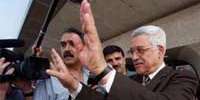Young Palestinians on the New Prime Minister

 4:42
Nancy Updike
4:42
Nancy Updike
Palestinian youth in Jerusalem on their new PM.
Broadcast: Sep 11 2003 on NPR Day to Day Subjects: Politics, International, Public Affairs
Profile: Four Palestinian men feel recent changes in Palestinian leadership have had no effect on their lives, nor do they see it changing anytime in the future
September 11, 2003 from Day to Day
ALEX CHADWICK, host: The Israeli Security Cabinet today met in emergency session to discuss possibly exiling Palestinian President Yasser Arafat. Two more suicide bombings earlier this week killed 15 Israelis, and Palestinian Prime Minister Mahmoud Abbas--also known as Abu Mazen--resigned. He was replaced by Ahmed Qorei. But for some who live in the West Bank, the change in leadership hardly seems to matter. Nancy Updike reports.
NANCY UPDIKE reporting:
I sat down in a pastry shop in the West Bank city of Ramallah with four Palestinian men in their 20s on the night their prime minister resigned. Nidal(ph), Saed(ph), Adeeb(ph) and Osama(ph) were eating cookies and drinking non-alcoholic cocktails. Abu Mazen's resignation had been barely a blip in their day, they said. I asked Saed, who's an accountant, what he and his friends had discussed instead of the resignation, when they'd told him about it earlier. The translator, Summer, asked him the question.
SUMMER: (Foreign language spoken)
(Soundbite of men laughing)
UPDIKE: And Saed's friends actually had to jump in and rescue him as he answered, because he started to sweat.
SUMMER: Osama, he told that, `I prefer not to say, don't say, don't say.' And he's laughing because he says, `What we were talking? We were talking about what the men usually talk about.'
UPDIKE: You're talking about girls.
Unidentified Man #1: Yeah.
(Soundbite of laughter)
SUMMER: Yes.
Unidentified Man #2: (Foreign language spoken)
(Soundbite of laughter)
SUMMER: `It's more--talking about girls, it's more important than talking about Abu Mazen.'
UPDIKE: They're laughing, but they're not really joking. In the three-plus months that Abu Mazen was the Palestinian prime minister, their lives did not get any better as the fanfare had promised. And they don't expect better from Ahmed Qorei, either. This is Osama, a microbiologist, who laughed as much as the others did, but whose demeanor seemed very sad. He talked about trying to get home a few weeks ago to see his parents in Nablus, a city in the north of the West Bank. There are several Israeli army checkpoints between Ramallah and Nablus.
OSAMA: Just on the checkpoint, five and a half hours, although I have the ID of Nablus. My address is Nablus, and they didn't let me in. So I can't feel that Abu Mazen changed anything here. Anybody who came, he will be another Abu Mazen and Arafat is Arafat. They were fighting each other, and it will still like this. It will not change.
UPDIKE: Forever?
OSAMA: Well, till Arafat is done.
UPDIKE: That prompted me to ask this question.
What political figures do you trust?
SUMMER: (Foreign language spoken)
(Soundbite of men speaking in foreign language)
OSAMA: It is hilarious, because there isn't anybody trustable over here. There isn't anybody trustable, I think.
UPDIKE: I turned to Saed and said, `If you could pick someone to lead the Palestinian people, who would it be?' He said, `I can't pick anyone.'
SAED: (Foreign language spoken)
SUMMER: He said that, `All of them, they leave the parents' lives, our lives, as Palestinians. They have their own companies, they are improving their situation, improving their money. They have their own cars and they live in their villas. And they just go on TV and they give some speeches or statement, and then he goes back to his life. This is what they do.'
UPDIKE: I turned back to Osama to ask my last question.
Describe your life in five years.
OSAMA: (Foreign language spoken)
SUMMER: `I can't any--I will not describe it.'
UPDIKE: Why not?
OSAMA: (Foreign language spoken)
SUMMER: `I don't feel that I will have life.'
UPDIKE: What do you mean?
SUMMER: (Foreign language spoken)
OSAMA: (Foreign language spoken)
SUMMER: He said that what he means--his dream is to stay in this country. He doesn't want to go to other places and he wants to live here. But he feels that there is no future, and this is why he thinks that he will have no life, because of the troubles and the situation which is here. And this is why he feels that he will never have a normal life to live in.
UPDIKE: For DAY TO DAY, this is Nancy Updike.
CHADWICK: Nancy Updike's story was produced with a grant from the Corporation of Public Broadcasting for HearingVoices.com.
(Soundbite of music)
CHADWICK: This is DAY TO DAY from NPR News.

